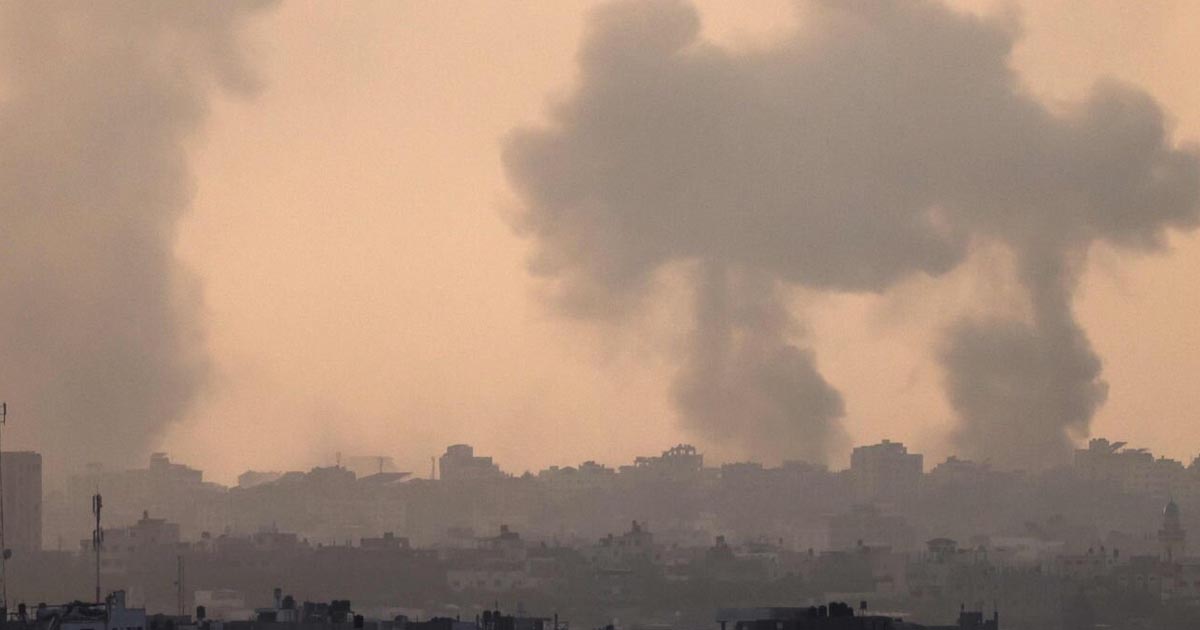
Israel Strikes Gaza, Syria and West Bank as War Against Hamas Threatens to Ignite Other Fronts
-


CIA Contractor Claims Mike Pompeo, Staff Withheld Information from Trump
-


NYPD Storms Columbia to Clear Occupied Building — 100 Pro-Palestine Protesters Arrested
-
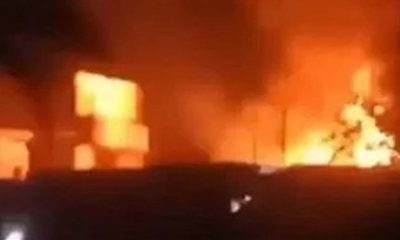

Islamist Extremists Attack & Burn Christian Homes in Egypt
-


OnlyFans Creator Claims She Was Paid to Spread ‘Political Propaganda’ for Biden Admin
Israeli warplanes struck targets across Gaza overnight and into Sunday, as well as two airports in Syria and a mosque in the occupied West Bank allegedly used by militants, as the 2-week-old war with Hamas threatened to spiral into a broader conflict.
Israel has traded fire with Lebanon’s Hezbollah militant group on a near-daily basis since the war began, and tensions are soaring in the Israeli-occupied West Bank, where Israeli forces have battled militants in refugee camps and carried out two airstrikes in recent days.
Israeli Prime Minister Benjamin Netanyahu told troops in northern Israel that if Hezbollah launches a war against Israel, “it will make the mistake of its life. We will cripple it with a force it cannot even imagine and the consequences for it and the Lebanese state will be devastating.”
For days, Israel has seemed to be on the verge of launching a ground offensive in Gaza as part of its response to Hamas’ deadly Oct. 7 rampage. Tanks and tens of thousands of troops have massed at the border, and Israeli leaders have spoken of an undefined next stage in operations.
Israel’s military spokesman, Rear Adm. Daniel Hagari, said the country had increased airstrikes across Gaza to hit targets that would reduce the risk to troops in the next stage of the war.
Hamas said it fought with Israeli forces near Khan Younis in southern Gaza and destroyed a tank and two bulldozers. The Israeli military said it had no information about the claim.
On Saturday, 20 trucks entered Gaza in the first aid shipment into the territory since Israel imposed a complete siege two weeks ago.
Egypt’s state-run media reported 17 more trucks crossing into Gaza on Sunday, but the United Nations said none had crossed.
“Until now, there is no convoy,” said Juliette Touma, spokeswoman for the U.N. agency for Palestinian refugees.
In a sign of how precarious any movement of aid remains, two Egyptian officials said Israeli shells hit close to the Egyptian side of the crossing Sunday, wounding nine Egyptian border guards. The officials spoke on condition of anonymity because they were not authorized to brief the media.
The Israeli military said a tank had accidentally fired and hit an Egyptian post, and the incident was being investigated. It apologized for the incident.
Relief workers said far more aid was needed to address the spiraling humanitarian crisis in Gaza, where half the territory’s 2.3 million people have fled their homes. The U.N. humanitarian agency, known as OCHA, said Saturday’s convoy carried about 4% of an average day’s imports before the war and “a fraction of what is needed after 13 days of complete siege.”
The Israeli military said the humanitarian situation was “under control,” even as OCHA called for 100 trucks a day to enter.
Israel repeated its calls for people to leave northern Gaza, including by dropping leaflets from the air. It says an estimated 700,000 have already fled, but hundreds of thousands remain. That would raise the risk of mass civilian casualties in any ground offensive.
Israeli military officials say Hamas’ infrastructure and underground tunnel system are concentrated in Gaza City, in the north, and that the next stage of the offensive will include unprecedented force there. Israel says it wants to crush Hamas, but officials have also spoken of carving out a possible buffer zone to keep Palestinians from approaching the border.
Heavy airstrikes were reported across Gaza, including in the southern part of the coastal strip, where Israel has told civilians to seek refuge. At the Al-Aqsa hospital in Deir al-Balah, south of the evacuation line, several bodies wrapped in white shrouds were lined up outside on the ground.
Airstrikes also smashed through the marketplace in the Nuseirat refugee camp. Witnesses said at least a dozen people were killed.
Israel’s military has said it is striking Hamas fighters and installations, but does not target civilians. Palestinian militants have fired over 7,000 rockets at Israel, according to the military, and Hamas says it targeted Tel Aviv early Sunday.
More than 1,400 people in Israel have been killed — mostly civilians slain during the initial Hamas attack. At least 212 people were captured and dragged back to Gaza. Two Americans were released on Friday.
More than 4,600 people have been killed in Gaza, according to the Hamas-run Health Ministry. That includes the disputed toll from a hospital explosion.
Syrian state media, meanwhile reported that Israeli airstrikes hit the international airports in the capital, Damascus, and the northern city of Aleppo, killing one person and putting the runways out of service.
Israel has carried out several strikes in Syria since the war began. Israel rarely acknowledges individual strikes, but says it acts to prevent Hezbollah and other militants from bringing in arms from Iran, which also supports Hamas.
In Lebanon, Hezbollah said six fighters were killed Saturday, and the group’s deputy leader, Sheikh Naim Kassem, warned that Israel would pay a high price if it invades Gaza. Israel struck Hezbollah targets Sunday in response to rocket fire, the military said.
Israel also announced evacuation plans for another 14 communities near the Lebanon border.
In the Israeli-occupied West Bank, 91 Palestinians have been killed — including six Sunday — in clashes with Israeli troops, arrest raids and attacks by Jewish settlers since the Hamas attacks, according to the Palestinian Health Ministry. Israeli forces have closed crossings into the territory and checkpoints between cities, measures they say are aimed at preventing attacks. Israel says it has arrested more than 700 Palestinians since Oct. 7, including 480 suspected Hamas members.
Among the dead were two killed in an airstrike on a mosque in the town of Jenin, which has seen heavy gun battles over the past year.
The Israeli military said the mosque compound belonged to Hamas and Islamic Jihad militants who had carried out several attacks in recent months and were planning another one.

News
Lindsey Graham Phone Hacked: Report
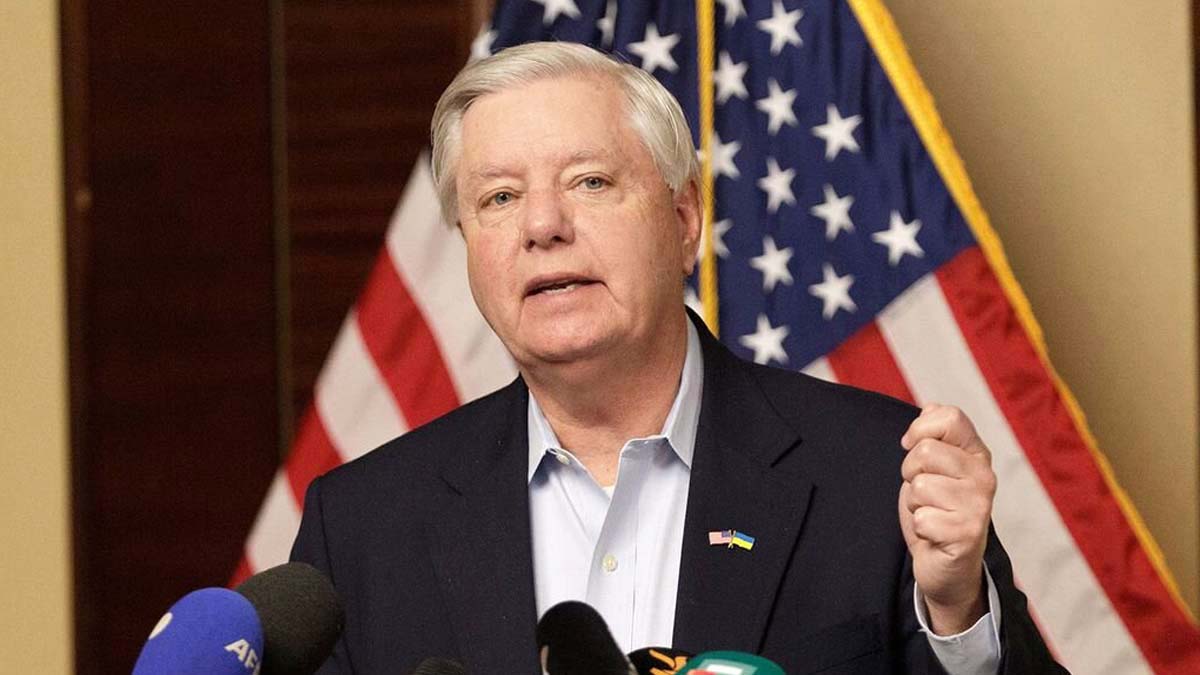
Sen. Lindsey Graham said Wednesday that the FBI took possession of his phone after someone attempted to trick the South Carolina Republican into thinking he was communicating with Senate Majority Leader Charles E. Schumer.
Mr. Graham revealed the potential hack in remarks at the Hill & Valley Forum on Capitol Hill, which is a gathering of top tech and government officials meeting in Washington to discuss artificial intelligence security.
Asked about spies targeting Silicon Valley and how AI labs should prepare themselves, Mr. Graham said people should be concerned and relayed his own brush with apparent hackers.
“My phone is in the hands of the FBI now,” Mr. Graham said at the forum.
“So I get a message, I think, from Schumer, it ain’t from Schumer, and next thing you know, my phone’s, I don’t know what. Anything you can create apparently can be hacked.”
Mr. Graham did not identify who he suspected was responsible. Taylor Reidy, Mr. Graham‘s spokeswoman, said the Senate’s Sergeant at Arms was investigating.
News
CIA Contractor Claims Mike Pompeo, Staff Withheld Information from Trump

American political activist and author James O’Keefe on Wednesday released a video, claiming a CIA official Amjad Fseisi was caught admitting that the agency and several officials, including Mike Pompeo, witheld information from Donald Trump when he was president.
The official can be heard saying that the Central Intelligence Agency is currently monitoring the Republican and his ex-wife. The intelligence agency has not reacted to the video yet.
O’Keefe, in a post on X, platform formerly known as Twitter, said that Fseisi is a project manager working in cyber operations for the CIA. He is also a National Security Agency (NSA) contractor with top-secret clearance working for Deloitte.
Fseisi, according to James O’Keefe, was on undercover cameras when he implicated ‘the highest levels of the intelligence agencies, including the executive staff’
“We’re talking about the director and his subordinates, former CIA Directors Gina Haspel. And I believe Mike Pompeo did the same thing too,” the official can be heard saying. He further adds that they ‘kept information from him (Trump) because we knew he’d f***ing disclose it.”
Watch:
BREAKING 🚨 CIA and NSA contractor, Amjad Fseisi, has been fired following a leak of a video that confirms Mike Pompeo and Gina Haspel withheld information from @realDonaldTrump in fear that he would disclose it to the public.
— The Real Toria Brooke (@realtoriabrooke) May 1, 2024
Amjad futher adds that Trump is a ‘Russian asset’. “There are certain people that would give him a high-level overview but never give him any details. You know why? Because he’ll leak those details. He’s a Russian asset. He’s owned by the fucking Russians.”
The video shows the CIA official saying he and his team are monitoring the former president. “We monitor everything. We also have people that monitor his ex-wife. He likes to use burner phones.”
He reveals that the CIA steals information and hack other countries ‘just like that’. Amjad states that he currently works on the CIA’s China Mission Center.
“We don’t share information across agencies” because the CIA is “very reluctant” to share information with the “careless” NSA, he says.
News
Harvey Weinstein Will Face New Rape Trial

“We believe in this case, and we will be retrying this case,” prosecutors in Harvey Weinstein’s New York rape case told a judge today in the first hearing since the much-accused producer’s 2020 conviction was overturned last week. “It was a strong case in 2020 …and it remains a strong case in 2024,” added Assistant District Attorney Nicole Blumberg.
Weinstein was sitting in the courtroom as the officials from the Manhattan District Attorney’s office announced their intention to take the case back to a jury. The trial could begin as quickly as September, if room can be found on the court calendar.
“We are happy to hear that the prosecutors want a speedy trial,” Weinstein chief attorney Arthur Aidala told the court as he once again proclaimed his client’s innocence. “It’s a new trial, it’s a new day … his life is on the line.”
Charged and arrested for rape in May 2018 after revelations by the New York Times in late 2017 detailing decades of abuse and alleged assaults by Weinstein, the defendant was convicted in February 2020 on first-degree sexual assault and third-degree rape after allegations by two women, Mimi Haley and Jessica Mann.
While not handling the case directly, Manhattan D.A. Alvin Bragg himself was in attendance Wednesday in Judge Curtis Farber’s court, as was attorney Gloria Allred, who represents Haley and Mann.
In fact, Mann was brought directly into today’s proceedings when Assistant D.A. Blumberg, who is the head of the office’s Intimate Partner and Sexual Violence Bureau, pointed to her in the courtroom. “She’s here today to show she’s not backing down … the defendant may have power and privilege but she has the truth.”
“Good afternoon Mr. Weinstein,” said Judge Farber as the wheelchair bound producer was brought into the courtroom around 11:23 a.m. PT. Almost seconds after his client was seated at the defense table, lead lawyer Aidala addressed the court with objections to photos being taken in the courtroom.
Despite all the lead-up, today’s hearing was over in less than 20 minutes. Weinstein did not speak once during the session.
The next hearing in the case has been set now for May 29. Weinstein is expected to be present.
Under medical supervision at Bellevue Hospital since the weekend, a blue-suited Weinstein was wheeled into the Manhattan court building around 10:15 am PT. Looking gaunter than he did at his 2022 LA trial, Weinstein’s blazer still had the price tag on it as he was brought in surrounded by heavily armed police. By the time Weinstein arrived in the courtroom proper, the price tag on his sleeve had been removed.
Announced less than a day after New York state’s Appeals Court in a 4-3 vote overturned 72-year old Weinstein’s 2020 sex crimes conviction which resulted in sex offender status and 23-year sentence, the intention of today’s hearing was to release Weinstein from his conviction of four years ago. Coming off long delayed oral arguments in February, the Appeals Court agreed with Weinstein’s lawyers in last week’s order. At the heart of overturning the conviction was a determination, led by Judge Jenny Rivera writing for the majority, that the inclusion of Prior Bad Acts testimony by now ex-Justice James Burke from a number of women on uncharged assault and abuse accusations was prejudicial in the 2020 trial.
With a new trial ordered by the Empire State’s highest court, the hearing in Judge Farber’s courtroom also re-arraigned Weinstein on the sex crimes charges for which he was originally arrested in 2018.
Still, due to his 2022 conviction on sex crimes in the City of Angels and sentencing to 16 years behind bars, Weinstein will not be released after Wednesday’s hearing. Instead, having been moved from the medium security Mohawk Correctional Facility in upstate New York late last week, the ailing Oscar-winning producer will be returned to Bellevue, at least in the short term.
In preparation for a new trial, Weinstein will likely remain in NYC to be close to his core legal team of Aidala and Diana Sampson. As was the case in the immediate aftermath of his sentencing four years ago and ever so briefly last week, Weinstein could be transferred to the notorious Rikers Island as the wheels of justice grind on.
There is no expectation in the short term that Weinstein will be sent out to LA to serve his West Coast sentencing. Insiders at LA County District Attorney George Gascón’s office tell Deadline there is “no need” for such a transfer right now.
In that vein, even before today’s hearing, Manhattan District Attorney Bragg’s office strongly indicated they wanted to take the case to a new trial “We will do everything in our power to retry this case, and remain steadfast in our commitment to survivors of sexual assault,” the D.A.’s office said on April 25, and reiterated on April 26.
Also on April 26, Haley said at an LA press conference in Allred’s office that she was “sick to her stomach” upon learning of Weinstein’s conviction being overturned by the New York Appeals Court. Coming forward just over seven years ago to say she was raped by Weinstein in his SoHo apartment in 2006, Haley was a major witness at the 2020 trial.
Whether she will be a witness in a second NYC Weinstein trial is unknown right now.
“I definitely don’t want to actually go through that again,” the Allred-represented Haley said in an LA press conference late last week. “But for the sake of keeping going and doing the right thing, because it is what happened, I would consider it,” she went on to say.
The presence of Allred at today’s hearing implies that Haley may be very seriously considering taking the stand again at a second NYC Weinstein trial.
The circus atmosphere and high security that has enveloped the Manhattan Criminal Courts building in recent weeks due to Donald Trump’s so-called hush money trial was greatly diminished. Wednesdays have been a dark day for the DA-prosecuted case over whether the $130,000 the former Celebrity Apprentice host paid to porn star Stormy Daniels to bury the news of their alleged affair just before the 2016 election. Hence, Trump and his army of lawyers were nowhere to be seen.
In addition to the New York criminal case heading for a new trial and an appeal of his LA conviction, Weinstein has a plethora of civil cases pending against him for alleged attacks and rapes over the past 30 years.
News
14-Year-Old Active Shooter Shot and Killed by Police Before He Could Enter Wisconsin Middle School
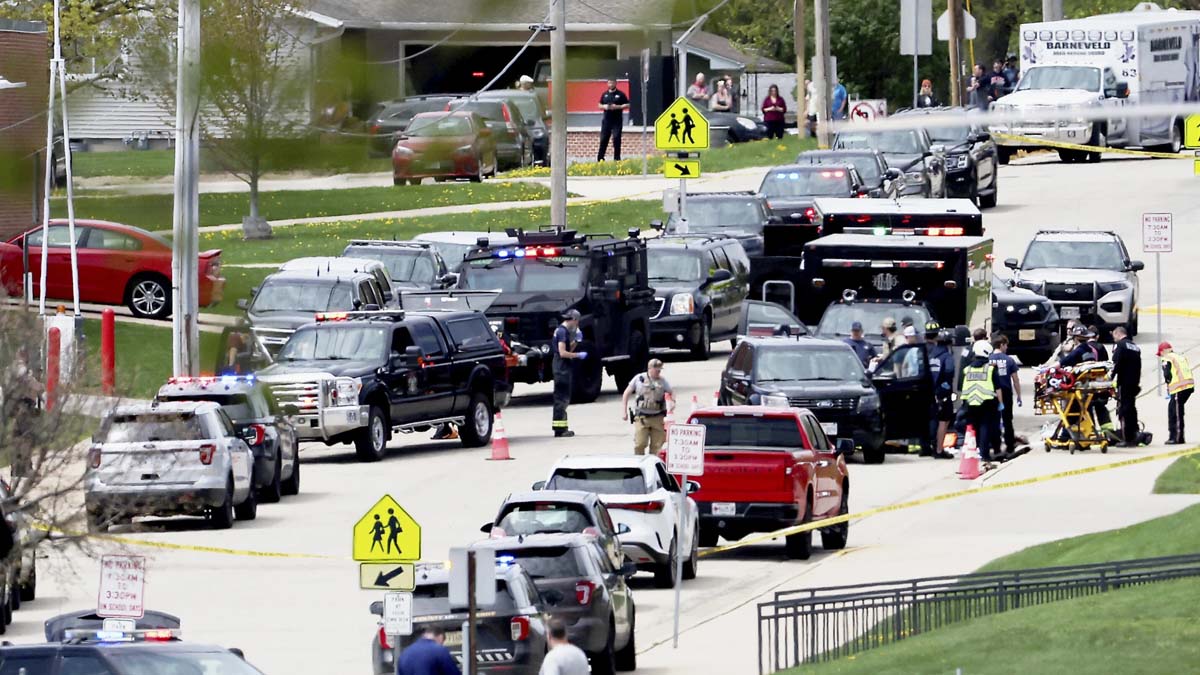
Wisconsin police said an active shooter threat was “neutralized” before he was able to enter a middle school with a rifle.
Police responded to reports of the active shooter at the Mount Horeb Middle School in Dane County at about 12:30 p.m. local time.
School officials reassured parents that none of the students were harmed and that the suspect did not breach the entryway of the school. The schools of the Mount Horeb Area school district went into a hard lockdown after the active shooter report.
One witness who worked about a block away from the school said she heard numerous gunshots and saw dozens of students running away.
“I thought it was fireworks. I went outside and saw all the children running,” said Jeanne Keller to the Associated Press. “I probably saw 200 children.”
Parents were frantically trying to find their children after hearing about the lockdown.
“One of my daughters is still inside of the middle school as we speak, but all we know is that there are some kids that want to shoot,” said parent Brittany Rodriguez in an emotional interview with WISN-TV.
“To get a call when you’re at work of your babies crying, saying that there’s a shooting going on and, ‘We’re scared,’ and you’re 30 minutes away from them!” she added.
Officials later confirmed that the suspect had been a student of the middle school. They also said that Mount Horeb Police shot the student and that they were wearing active body cameras at the time.
Another parent said her children were leaving the school when the shooting happened.
“I literally have one that left the middle school five minutes before the shooting happened,” Melissa Alvarado said to WMTV-TV. “My other one was on this side of the school when the shots were fired and she said all the teachers were telling the children, they were yelling telling all the kids to run to the other side of the school and then about a half hour later she called and said they were barricading doors.”
Democrat Wisconsin Gov. Tony Evers released a brief statement about the shooting on social media.
“I have been briefed on the incident at the Mount Horeb Area School District and am closely monitoring the situation,” he posted. “I am praying for the health and safety of our kids, educators, and staff and grateful for the first responders who are working quickly to respond.”
School officials credited their security precautions for preventing the alleged threat from entering into the school.
Here’s more about the incident:
News
Arizona Senate Approves Repeal of Near-Total Abortion Ban
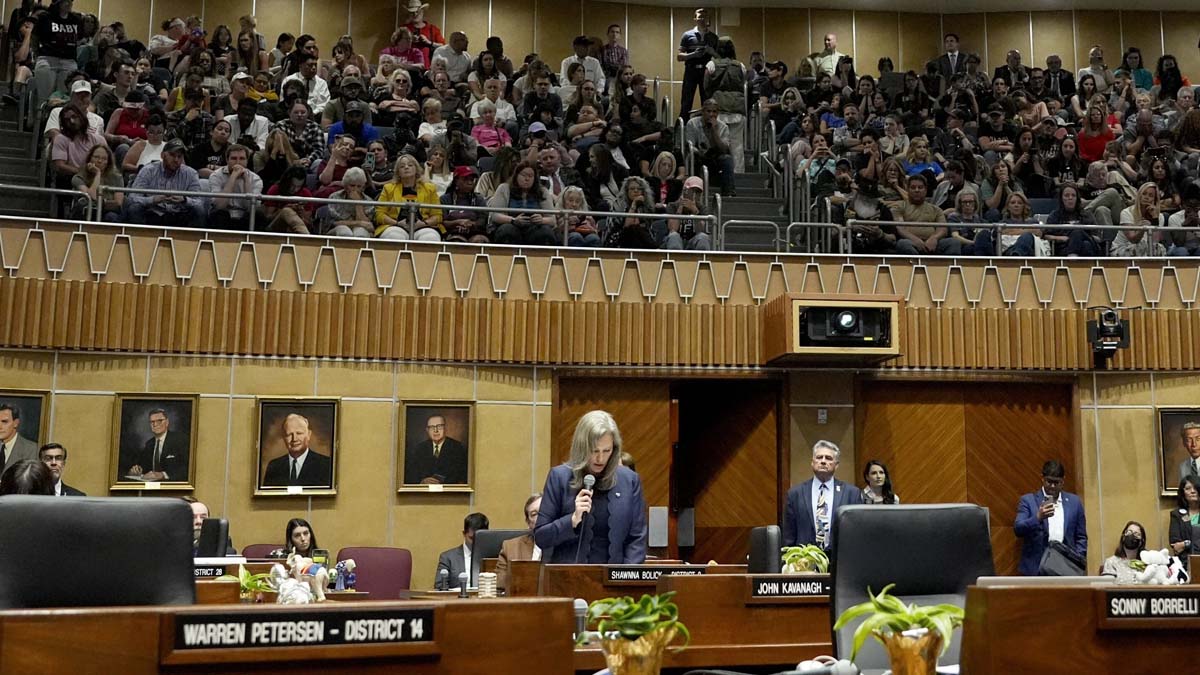
Arizona’s near-total abortion ban will be repealed just weeks after the state’s Supreme Court ruled it enforceable.
The Arizona House narrowly passed the repeal on April 24 as three Republicans joined with Democrats to approve the measure.
On May 1, the state Senate followed suit in a 16–14 vote—but not before several disappointed senators had the opportunity to air their grievances.
“What we’re actually voting on is death,” state Sen. Anthony Kern said, chiding the members of his Republican party who voted with Democrats in support of the repeal.
“The Democrat Party stands and runs on death. The Republican Party stands and is supposed to run on life.”
State Sen. Sonny Borrelli, meanwhile, objected to the fact that the bill was never sent to a committee, nor was any time allotted for debate or amendments. And during one particularly emotional moment, state Sen. Justine Wadsack recounted her own tragic loss of a child by miscarriage.
“God chose when that heartbeat was going to stop,” Ms. Wadsack said, tears streaming down her face. “It is not my place as a senator to determine when a child’s heart stops beating.”
The abortion ban prohibits all abortions in Arizona except those performed to save the mother’s life. It was initially enacted in 1864, before Arizona was a state, though it was later recodified by the Legislature in the late 1970s.
Arizona Gov. Katie Hobbs, a Democrat, has promised to sign the repeal once it reaches her desk. At that point, a 2022 law limiting abortions to 15 weeks of pregnancy will become the state’s prevailing law.
Proponents of the repeal, pointing to the ban’s pre-statehood origins, had argued that it was outdated and inconsistent with the state’s more recent laws.
“I don’t want us honoring laws about women, written during a time when women were forbidden from voting because their voices were considered inferior to men,” state Sen. Eva Burch said May 1.
For decades, the law was blocked by a permanent injunction. But a two-year court battle, prompted by the reversal of Roe v. Wade, culminated in the Arizona Supreme Court’s bombshell ruling on April 9.
Although the court initially stayed the law’s enforcement for two weeks, an agreement in a related case pushed back its effective date. The ban was expected to take effect on June 27.
The Arizona vote came on the same day that a six-week abortion limit in Florida took effect.
That law includes limited exceptions for situations involving rape, incest, human trafficking, or a serious threat to the mother’s physical health. But as with the Arizona ban, the law has been the subject of much controversy.
As the Florida law took effect, abortion advocates took to social media to decry what they perceived to be the erosion of women’s rights in the Sunshine State.
“Today, Florida is putting the health of millions of women at risk,” New York Gov. Kathy Hochul posted on social media. “It’s clear: Anti-choice extremists will stop at nothing to deny women their right to make their own health care decisions.”
Nikki Fried, chair of the Florida Democratic Party, likewise charged that the law had rolled back women’s rights “by 50 years,” and President Joe Biden called the situation a “nightmare.”
Florida and Arizona are expected to play a key role in deciding the next president, and abortion will be on the ballot in both states come November.
While President Biden has aligned himself with abortion advocates, former President Donald Trump, the presumptive Republican nominee, has shied away from what he’s deemed to be a losing issue for the GOP.
The former president, who claims to be pro-life, has said he believes abortion to be a states’ rights issue, as opposed to a federal issue. In taking that stance, he denounced both the Arizona and Florida laws as too restrictive.
“It’s the will of the people—this is what I’ve been saying. It’s a perfect system,” he said on April 10.
“For 52 years, people have wanted to end Roe v. Wade, to get it back to the states. We did that—it was an incredible thing, an incredible achievement. We did that, and now the states have it, and the states are putting out what they want. It’s the will of the people.”
News
15 Arrested After Police Enter Fordham’s Anti-Israel Encampment to Remove Protesters

Fifteen arrests were reportedly made after a “Gaza Solidarity Encampment” popped up at Fordham University on Wednesday, only to be taken down by police later in the day.
The encampment also occurred hours after tent cities at two other NYC universities were destroyed by police.
Two prison buses have arrived at the encampment, and the school notified protesters late Wednesday afternoon that they’re suspended and banned from campus.
The night before, hundreds of anti-Israel demonstrators were arrested at Columbia and the City College of New York campuses in a “massive” NYPD operation.
A total of 282 people were arrested: 109 people at the Ivy League campus after cops busted the mob that took over the university’s Hamilton Hall, and 173 at the “intifada” encampment at City College.
Fifteen people were reportedly arrested after police entered the lobby of Fordham University’s Leon Lowenstein Center from inside, where students had erected tents as part of a “Gaza Solidarity Encampment.”
The school requested the NYPD to disperse the encampment, according to a letter from Fordham.
“In an effort to ensure that further escalation does not occur, I have determined that the encampment and related disruptions pose a clear and present danger,” the letter states.
Cops removed the protesters from the encampment while wearing riot gear, arresting demonstrators at around 5:40 p.m on Wednesday.
The protesters — who had already been suspended and told they were trespassing — were handcuffed by Strategic Response Group police and escorted into the building away from the roughly 300 supporters chanting for their release from the sidewalk.
#HappeningNow: In an effort to ensure further escalation does not occur, @FordhamNYC has requested our assistance to disperse an unlawful encampment of individuals inside one of their buildings. Attached is the letter from the university.
Your @NYPDnews officers continue to… pic.twitter.com/oU3SKzmJYg
— NYPD Deputy Commissioner, Operations Kaz Daughtry (@NYPDDaughtry) May 1, 2024
News
Iran University Offers Scholarships to US Students Expelled Over Gaza Protests
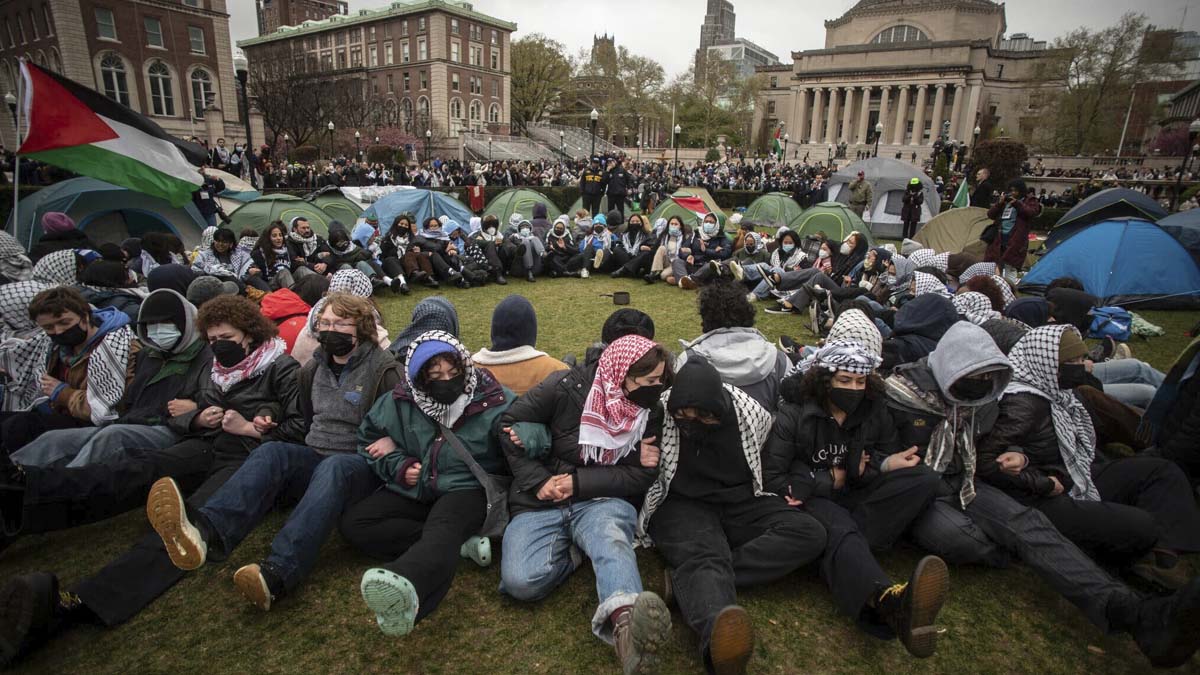
One of Iran’s most prestigious universities is offering scholarships to US students who have been expelled for taking part in pro-Palestinian protests.
Mohammad Moazzeni, head of Shiraz University in Fars, made the offer to students demonstrating against Israel’s actions in its war against Hamas in Gaza, Iranian state-owned outlet Press TV reports.
“Students and even professors who have been expelled or threatened with expulsion can continue their studies at Shiraz University and I think that other universities in Shiraz as well as Fars Province are also prepared [to provide the conditions],” he said, according to the outlet.
US students have been facing arrest or dismissal from their colleges over their actions in support of a ceasefire in Gaza, with many students also calling for their universities to divestment from companies that are supporting Israel.
The Iranian regime backs Hamas against Israel, which has killed at least 34,000 people in its bombardment of the Gaza Strip. Israel launched continuous strikes and a ground invasion of the enclave as it vowed to destroy Hamas for its October 7 attacks which left at least 1,200 people dead, with some 250 taken hostage.
Moazzeni added that he was “announcing Shiraz University’s decision to offer scholarships to students expelled from European and American universities.”
Dueling groups of protesters clashed Wednesday at the University of California, Los Angeles, grappling in fistfights and shoving, kicking and using sticks to beat one another.
Hours earlier, police burst into a building at Columbia University that pro-Palestinian protesters took over and broke up a demonstration that had paralyzed the school while inspiring others.
After a couple of hours of scuffles between pro-Palestinian and pro-Israeli demonstrators at UCLA, police wearing helmets and face shields formed lines and slowly separated the groups. That quelled the violence, and the scene was calm as day broke.
Tent encampments of protesters calling on universities to stop doing business with Israel or companies that support the war in Gaza have spread across the country in a student movement unlike any other in the 21st century, reaching from New York to Texas and California.
The ensuing crackdown by police on some college campuses has stirred echoes of the much larger student protest movement during the Vietnam War-era.
There have been confrontations with law enforcement and more than 1,000 arrests. In rarer instances, university officials and protest leaders struck agreements to restrict the disruption to campus life and upcoming commencement ceremonies.
News
More Than $300K Raised for UNC Frat Brothers Who Protected American Flag from Pro-Palestine Mob

A group of patriotic frat brothers at the University of North Carolina are being rewarded for protecting the Stars and Stripes from an anti-Israeli mob bent on hoisting the Palestinian colors.
A GoFundMe page set up for the Pi Kappa Phi students has raised more than $122,000 as of Wednesday afternoon for the students’ heroic stand this week at the UNC-Chapel Hill campus — “to throw this frat the party they deserve,” the fundraising site said.
“Commie losers across the country have invaded college campuses to make dumb demands of weak university administrators,” the organizers wrote.
“But amidst the chaos, the screaming, the antisemitism, the hatred of faith and flag, stood a platoon of American heroes.
“Armored in Vineyard Vines and Patagonia, fueled by Zyn and White Claws, these triumphant Brohemians protected Old Glory from the unwashed Marxist horde, laughing at their shrieks and wails and shielding the Stars & Stripes from Soviet missiles,” the site read.
The confrontation happened Tuesday when the campus — among dozens in the nation occupied by anti-Israeli demonstrations — was targeted by a pro-Palestinian student mob, Newsweek reported.
The protesters moved in to raise the Palestinian flag during a confrontation with counter-protesters on campus — when Pi Kappa Phi stepped into the fray.
A group of frat brothers grabbed the American flag to keep it from touching the ground, all the while being pelted with debris and taunts from the angry mob, according to the outlet.
Old Glory was later raised after the Palestinian flag was taken down — with students chanting “USA, USA” — and is now protected by a barricade.
But the frat’s efforts are not forgotten.
“These boys … no, men, of the UNC-Chapel Hill Pi Kappa Phi gave the best to America and now they deserve the best,” the fundraising site said.
“Helps us raise funds to throw this frat the party they deserve, a party worth of the boat-shoed Broleteriat who did their country proud.”
Three dozen anti-Israel protesters were arrested by police on the UNC campus on Tuesday.
News
White House Considers Accepting Gaza Palestinians as Refugees
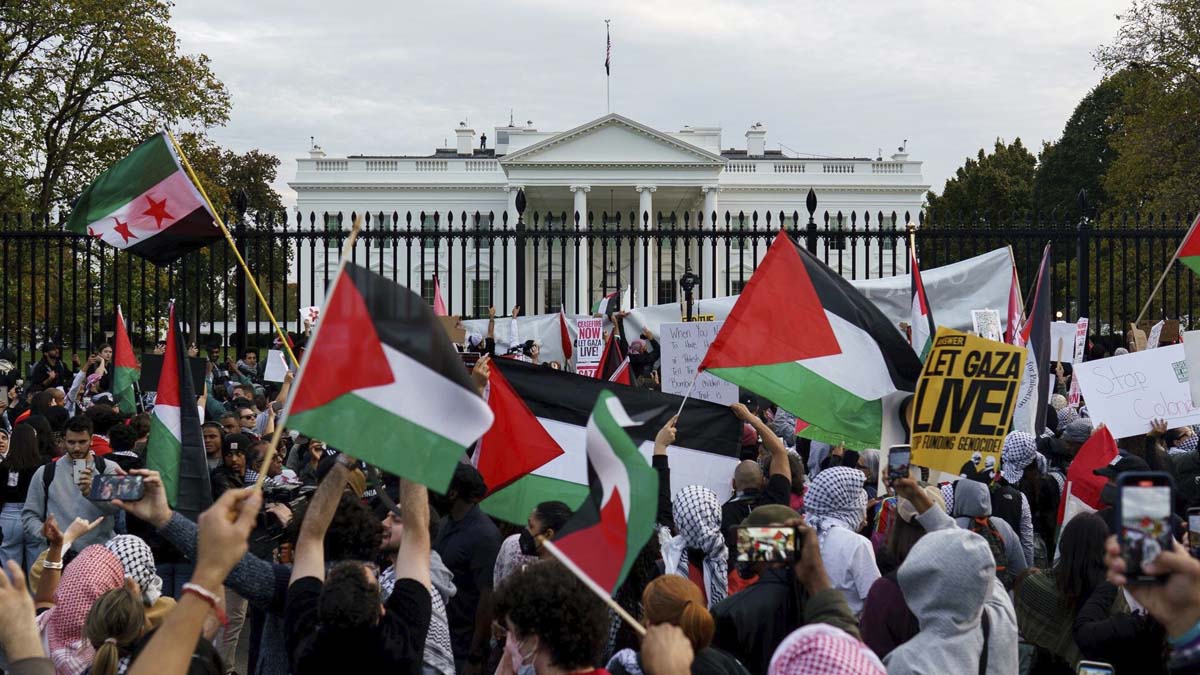
The Biden administration is considering bringing certain Palestinians to the U.S. as refugees, a move that would offer a permanent safe haven to some of those fleeing war-torn Gaza, according to internal federal government documents obtained by CBS News.
In recent weeks, the documents show, senior officials across several federal U.S. agencies have discussed the practicality of different options to resettle Palestinians from Gaza who have immediate family members who are American citizens or permanent residents.
One of those proposals involves using the decades-old United States Refugee Admissions Program to welcome Palestinians with U.S. ties who have managed to escape Gaza and enter neighboring Egypt, according to the inter-agency planning documents.
Top U.S. officials have also discussed getting additional Palestinians out of Gaza and processing them as refugees if they have American relatives, the documents show. The plans would require coordination with Egypt, which has so far refused to welcome large numbers of people from Gaza.
Those who pass a series of eligibility, medical and security screenings would qualify to fly to the U.S. with refugee status, which offers beneficiaries permanent residency, resettlement benefits like housing assistance and a path to American citizenship.
In a statement provided to CBS News late Tuesday night, a White House spokesperson said that the U.S. “has helped more than 1,800 American citizens and their families leave Gaza, many of whom have come to the United States. At President Biden’s direction, we have also helped, and will continue to help, some particularly vulnerable individuals, such as children with serious health problems and children who were receiving treatment for cancer, get out of harm’s way and receive care at nearby hospitals in the region.”
The statement went on to say that the U.S. “categorically rejects any actions leading to the forced relocation of Palestinians from Gaza or the West Bank or the redrawing of the borders of Gaza. The best path forward is to achieve a sustainable cease-fire through a hostage deal that will stabilize the situation and pave the way to a two-state solution.”
The Israeli government launched a military offensive and aerial bombardment of Gaza after Hamas staged an unprecedented attack across Israel on Oct. 7, killing roughly 1,200 people, most of them civilians. Hamas militants also abducted more than 200 people, many of whom continue to be in captivity.
The proposals to resettle certain Palestinians as refugees would mark a shift in longstanding U.S. government policy and practice. Since its inception in 1980, the U.S. refugee program has not resettled Palestinians in large numbers.
Over the past decade, the U.S. has resettled more than 400,000 refugees fleeing violence and war across the globe. Fewer than 600 were Palestinian. In fiscal year 2023, the U.S. welcomed 56 Palestinian refugees, or 0.09% of the more than 60,000 refugees resettled during those 12 months, State Department statistics show.
While many Democrats would likely support the move, admitting Palestinians as refugees could spur even more political challenges for the Biden administration related to the Israel-Hamas war. The conflict has already exposed rifts within the Democratic Party, triggered massive protests on college campuses and divided communities across America.
To qualify to enter the U.S. as a refugee, applicants have to prove they are fleeing persecution based on certain factors, such as their nationality, religion or political views. While some Palestinians could say they are fleeing repression by Hamas, others could identify the military and government of Israel, a top U.S. ally and recipient of American aid, as a persecutor.
The resettlement of Palestinian refugees, even if small in scale, could also garner criticism from Republicans, who have sought to make concerns about immigration and illegal crossings at the U.S.-Mexico border defining issues in November’s elections.
Soon after the Oct. 7 attacks by Hamas and the start of Israel’s offensive in Gaza, leading Republicans, including presidential candidates, said the U.S. should not welcome Palestinian refugees, claiming that they are antisemitic and potential national security risks.
In recent years, the Biden administration has dramatically increased refugee resettlement, which was slashed to record lows by former President Donald Trump. U.S. officials have set a goal of admitting up to 125,000 refugees in fiscal year 2024, which ends at the end of September.
News
NYPD Storms Columbia to Clear Occupied Building — 100 Pro-Palestine Protesters Arrested
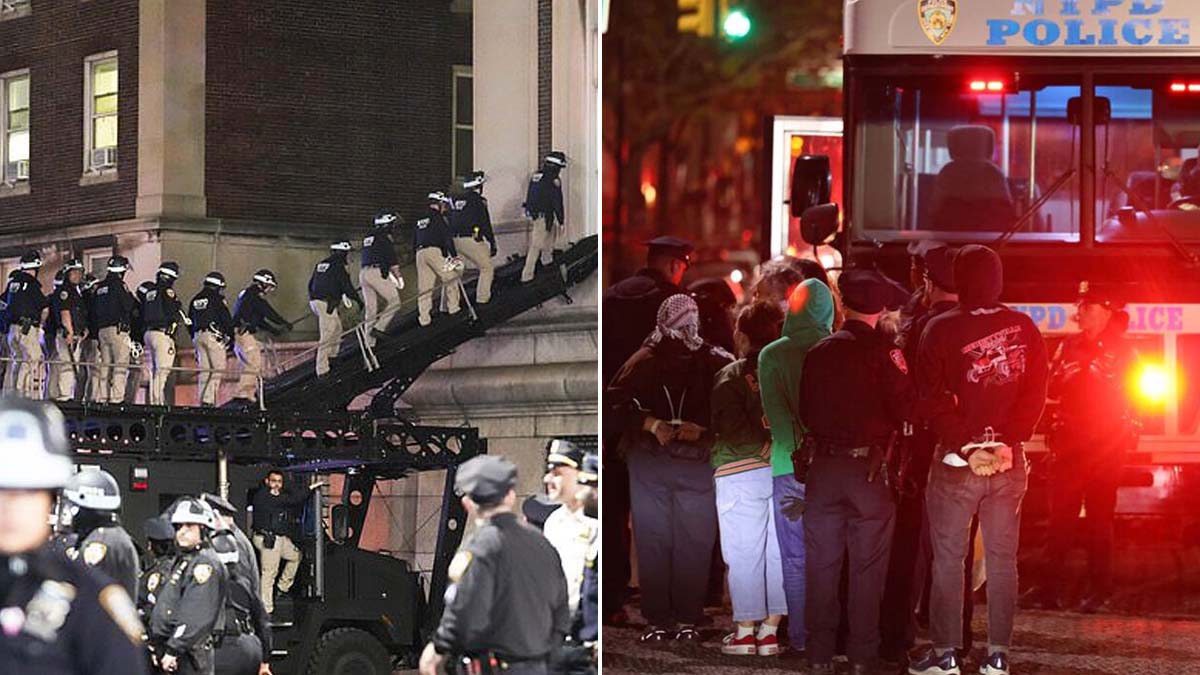
NYPD riot cops stormed Columbia University to quickly disperse protesters at an encampment and an occupied building in less than two hours.
Panicked pro-Palestine demonstrators tumbled down stairs as they tried to flee when cops flooded the Ivy League campus on Tuesday night.
Almost 100 people were arrested at the New York City university, according to NBC. Police stated there were no injuries or people resisting arrest.
Around 40 of those detained were picked up in on the first floor of Hamilton Hall, which students violently took over early Tuesday. Cops swooped in on the building through a window after using flash bangs to clear the way.
President Minouche Shafik called in the police ‘to restore order and safety’ to the campus amid the escalating protests and fears the demonstrations had been co-opted by external agitators.
University administrators have asked the NYPD to maintain a presence on campus until at least May 17, two days after graduation.
🚨#BREAKING: Police have begun entering the Hamilton Hall building through a second-floor window, deploying tear gas inside. Reports indicate there is an unconscious student in front of Hamilton Hall pic.twitter.com/IgoXOi6ZI6
— R A W S A L E R T S (@rawsalerts) May 1, 2024
Dozens of cops poured into Hamilton Hall via a window using a ramp attached to a huge armored truck. Video showed the police hammering at locked doors before sweeping in with riot shields.
Footage showed protesters being dragged out of the campus, some carried by several officers if they refused to walk, and loaded on to buses.
Just after 10pm, the campus was cleared out and locked down by police with many protesters heading north to City College of New York, where police were also raiding a similar encampment.
An encampment first sprung up at Columbia on April 17 after Shafik was hauled before Congress to address anti-Semitism on campus.
Around 9pm on Tuesday, officers stormed the university as the crowd chanted and yelled at them, some confronted the officers and pushed barricades to try and block their path.
A shelter in place warning was issued to students on Morningside campus in the moments before officers descended.
In a statement, the university said the decision to call in police was, ‘made to restore safety and order to our community’.
‘We regret that protesters have chosen to escalate the situation through their actions,’ the statement read.
Playtime is over.
NYPD is dragging protesters out of Columbia University.
US and Israel and Antifa are now both currently trending pic.twitter.com/bVaNBrDe9J
— Real Life Footage (@RealLifeFootage) May 1, 2024
NYPD is arresting Columbia student protesters and bussing them away after school officials calling police in pic.twitter.com/75plr4MDoB
— Bahar Ostadan (@BaharOstadan) May 1, 2024
‘After the University learned overnight that Hamilton Hall had been occupied, vandalized, and blockaded, we were left with no choice.
‘Columbia public safety personnel were forced out of the building, and a member of our facilities team was threatened. We will not risk the safety of our community or the potential for further escalation.’
Former president Donald Trump praised officer’s response to the situation, but said it should have come ‘a lot sooner.’
‘There’s tremendous damage that’s been done to that building, when you look at it it’s a landmark and it’s really been damaged by these people,’ he told Fox News. ‘People have to respect the law and order of this country.’
He also hit out at president Joe Biden and called for him to speak up more strongly against anti-Semitism.
The occupation of Hamilton Hall was the latest escalation in the unrest which has rocked the school in recent weeks. Protesters have been demanding the college divest from companies with links to Israel or firms profiting from its war on Hamas.
These large NYPD passenger buses just passed the Columbia campus entrance pic.twitter.com/HU4rnpCcsQ
— Steven Romo (@stevenromo) May 1, 2024
College officials have been battling to shut down the encampment, stating it violates university polices. Following the occupation of Hamilton Hall, Shafik warned that those involved would face expulsion.
More than 100 activists had already been arrested at the school prior to Tuesday’s operation.
A first encampment was broken up by NYPD officials. But university officials had vowed not to take similar steps for the current protest.
They gave students an ultimatum to leave, but few followed the instructions.
‘We will not leave until Columbia meets every one of our demands,’ one activist screamed from a balcony in the building after the takeover.
Officials then started to suspend students before a group raided Hamilton Hall.
‘We believe that the group that broke into and occupied the building is led by individuals who are not affiliated with the University,’ officials continued.
‘Sadly, this dangerous decision followed more than a week of what had been productive discussions with representatives of the West Lawn encampment.
‘The decision to reach out to the NYPD was in response to the actions of the protesters, not the cause they are championing. We have made it clear that the life of campus cannot be endlessly interrupted by protesters who violate the rules and the law.’
But the move was condemned by the Columbia University Chapter of the American Association of University Professors, which said its members had been locked out of campus.
‘NYPD presence in our neighborhood endangers our entire community. Armed police entering our campus places students and everyone else on campus at risk,’ a statement read.
‘We hold university leadership responsible for the disastrous lapses of judgement that have gotten us to this point.’
The statement added faculty had spent the trying to defuse the situation, but were ‘rebuffed or ignored.’
At a press conference prior to the raid, NYPD Assistant Commissioner Rebecca Weiner warned the protest had been co-opted by external agitators who were not affiliated with the university.
She stressed the occupation had the potential to spill into other campus buildings, as well as other universities across the country.
‘This is not about what’s happening overseas, it’s not about the last seven months, it’s about a very different commitment to at times violent protest activity as an occupation,’ she said.
BREAKING: POLICE AT COLUMBIA UNIVERSITY BARRICADING OBSERVERS, MEDICS, JOURNALISTS, STUDENTS INTO JOHN JAY AFTER PUSHING THEM ALL THE WAY BACK pic.twitter.com/w3p6NLpNa3
— Columbia Students for Justice in Palestine (@ColumbiaSJP) May 1, 2024
‘They haven’t got a right to be on campus and this violates university polices and most importantly, presents a danger to students and the university and communities.
‘When we see what we saw last night, we think these tactics are a result of guidance being given to students from these external actors.’
Police confirmed those occupying Hamilton Hall could be charged with trespass and burglary, while those in the encampment could be hit with trespassing and disorderly conduct charges.
The raid at Columbia came as cops flooded other campuses in the Big Apple including the City College of New York.
Video taken at the campus showed protesters letting off flares near the gates to the school.
News
Fight Over Johnson’s Fate Heats to a Boil as Dems Vow Unprecedented Rescue

The simmering debate over the fate of Speaker Mike Johnson (R-La.) reached a rolling boil on Tuesday when top Democrats vowed to shield the embattled GOP leader from a conservative coup — and immediately prompted the coup’s ringleader to pledge a vote to boot him from power.
Rep. Marjorie Taylor Greene (R-Ga.), who’s been sitting on her motion to vacate resolution for more than a month, said the Democrats’ promised rescue mission was the last straw in a long list of grievances she’s compiled against the Speaker since he won the gavel in October. In a scorching statement, she accused Johnson of cutting “slimy” deals with Democrats, urged him to switch parties and vowed to force the full House to vote on his removal.
“If the Democrats want to elect him Speaker (and some Republicans want to support the Democrats’ chosen Speaker), I’ll give them the chance to do it,” she posted on the social platform X.
“I’m a big believer in recorded votes because putting Congress on record allows every American to see the truth and provides transparency to our votes,” Greene continued. “Americans deserve to see the Uniparty on full display. I’m about to give them their coming out party!”
But Greene is keeping her cards close to her chest, refusing to say as of press time when she plans to force her resolution to the floor.
Greene declined to speak with reporters Tuesday when entering the House chamber — “I have to go vote” — then marched into the parliamentarian’s office afterwards alongside Rep. Thomas Massie (R-Ky.), a co-sponsor of the motion to vacate.
“Plans are still developing,” she told reporters on her way out of the Capitol.
The Georgia Republican has scheduled a press conference for 9 a.m. Wednesday, where she intends to detail her plan.
Greene’s fiery threat came less than an hour after the top three House Democrats — Minority Leader Hakeem Jeffries (N.Y.), Democratic Whip Katherine Clark (Mass.) and House Democratic Caucus Chair Pete Aguilar (Calif.) — issued an unprompted statement announcing their intent to protect Johnson from Greene’s effort to remove his gavel. The plan is not to have Democrats vote for Johnson’s Speakership directly, but to support a proposal to table Greene’s resolution — a procedural move preventing it from ever reaching the floor.
“There is a distinction there,” Aguilar told reporters.
The strategy was not quite a surprise: A number of rank-and-file Democrats had pledged to help Johnson remain in power if he ensured passage of key legislation, including aid for Ukraine, and Democratic leaders said nothing publicly to discourage that unusual offer.
Still, for the minority party to swoop in to keep a majority leader in power is unprecedented, and it highlights the extraordinary difficulties facing GOP leaders as they try to manage their hard-line critics with a hairline majority and steer legislation to President Biden’s desk.
A number of Democrats said they simply wanted to reward Johnson for responsible governance and bring some stability to the volatile lower chamber.
“It would be wrong to have Marjorie Taylor Greene drag him down into the gutter and drown him down there,” Rep. Juan Vargas (D-Calif.) said. “We’re not going to allow that.”
Democrats discussed that track record during a closed-door caucus meeting in the Capitol on Tuesday morning, where party leaders announced their plan to help Johnson survive a revolt.
“People talked about how he was the architect of the ‘Big Steal’ denial and the legal challenge there. So he did not come to this with clean hands,” Rep. Stephen Lynch (D-Mass.) said. “However, I think most members appreciate that we’re back in operative mode here, and we’re actually doing some things that are very, very important.”
Others were much more passionate in their criticisms.
“He’s dangerous, he’s an election denier, he’s a fundamentalist, and he’s not the leadership this country needs,” Rep. Jamaal Bowman (D-N.Y.) said.
For many Democrats, however, rescuing Johnson is preferable to allowing Greene to shut down the House, as a different group of conservatives had done in ousting former Speaker Kevin McCarthy (R-Calif.) in October.
“It’s not lost on me, the role that Mike Johnson played in the lead-up to Jan. 6,” said Aguilar, who sat on the Jan. 6 investigative committee. “However, we want to turn the page. We don’t want to turn the clock back and let Marjorie Taylor Greene dictate the schedule and the calendar of what’s ahead.”
The prospect that Democrats would keep Johnson in power sparked immediate questions about the impact on the Speaker’s standing in a GOP conference where conservatives are already furious at him for cutting bipartisan deals on big-ticket legislation.
Rep. Dan Bishop (R-N.C.) said a Democratic rescue mission would only “intensify” Johnson’s image problem among many Republican voters, who might come to believe he doesn’t fight hard enough for conservative priorities. But the change would be “in degree,” he added, “not in kind.”
“Speaker Johnson, a person for whom I have warm feelings, has formed a habit of passing legislation for Democrats. And he’s done it repeatedly,” Bishop said.
Rep. Chip Roy (R-Texas), another frequent leadership critic, offered a similar assessment of the potential fallout.
“We’ve been passing bills with Democrat votes all year anyways,” Roy said. “I’m not sure what difference it makes.”
Johnson, for his part, brushed off concerns about serving as a Speaker propped up by Democrats, describing his job as one that leads the entire House and not just the GOP conference.
“I am a conservative Republican — a lifelong conservative Republican. That’s what my philosophy is, that’s what my record is, and we’ll continue to govern on those principles,” Johnson said Tuesday.
“We shouldn’t be playing politics and engaging in the chaos that looks like palace intrigue here.”
The Democratic statement opposing Johnson’s ouster was just the latest blow to Greene’s vacate effort, which has failed to gain traction among Republicans.
A number of hard-line conservatives have said that, with elections quickly approaching, they simply don’t want to plunge the conference into a state of chaos.
“The sentiment is, and I’m taking this viewpoint, it’s not the right time to do this,” Rep. Ralph Norman (R-S.C.) said.
“Mike Johnson, saying all that, is a good man. He’s doing, in his mind, what he thinks is right,” Norman added. “Did he draw the red line with Biden? No. Did he take the Schumer-Pelosi-McConnell bill? Yes. But it is what it is.”
Making matters worse for Greene, former President Trump — of whom Greene considers herself a close ally — has sided with Johnson over the Georgia Republican.
“I stand with the Speaker, we’ve had a very good relationship,” Trump said during a joint press conference with Johnson at Mar-a-Lago earlier this month.
News
Israel Preps Delegation to Cairo for Last-Chance Gaza Cease-Fire
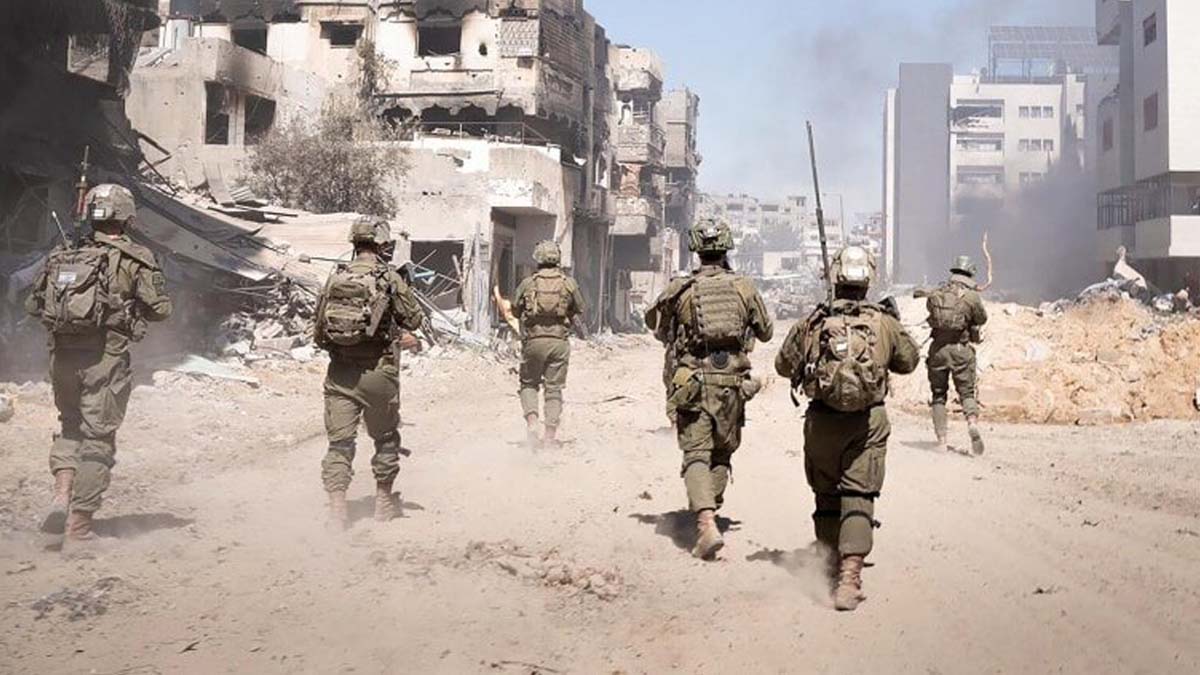
Israel is ready to send a delegation to Cairo in the coming days to discuss a halt in fighting in the Gaza Strip, Israeli and Egyptian officials said Tuesday, as Arab mediators push militant group Hamas to accept cease-fire terms before an impending military operation in Rafah.
David Barnea, the head of the Mossad intelligence agency, is considering a trip to the Egyptian capital this week after Arab mediators presented to Hamas over the weekend a deal to free hostages held by the group in return for a fighting pause, Egyptian officials said. An Israeli official said Tuesday that Israel could send a delegation depending on developments in the negotiations.
Israel has said the proposal is the last chance to delay a planned offensive on the southern Gazan city of Rafah that its officials hope would destroy the U.S.-designated terrorist group’s remaining military units there. An Israeli official said that preparations for a Rafah offensive are continuing.
White House officials stressed on Tuesday that Hamas should accept the proposal, and said that the U.S. is working hard to get the parties to reach a deal.
“This is a really good proposal, and Hamas ought to jump at it, and time is of the essence,” said National Security Council spokesman John Kirby.
Secretary of State Antony Blinken, who is traveling in the Middle East this week, said Monday that the U.S. couldn’t support a major military operation in Rafah without a plan to protect civilians, which he said Israel hadn’t yet provided.
Kirby reiterated that the U.S. wants Israel to hold off. “We don’t want to see a major ground operation in Rafah, certainly we don’t want to see operations that haven’t factored the safety and security into the 1.5 million folks who have tried to seek refuge down there,” he said Tuesday.
Kirby said the U.S. was being pragmatic about the negotiations. “We’re not going to give up…about getting these hostages home, about getting this cease-fire in place,” he said.
Israeli Prime Minister Benjamin Netanyahu said Tuesday that Israel would evacuate the civilian population in Rafah and move to destroy Hamas’s battalions there “with or without a deal,” echoing comments he has made in recent weeks. “The idea that we would stop the war before achieving all of its goals is out of the question,” he told the families of hostages held in Gaza.
Netanyahu faces pressure from far-right partners in his governing coalition not to ease up on Hamas. National Security Minister Itamar Ben-Gvir released a video on Tuesday saying that Netanyahu “understands very well” the consequences of stopping the war before a Rafah invasion or accepting what he called an irresponsible deal with Hamas. It was an apparent threat to exit from the coalition and collapse the government. Israel’s war cabinet canceled a meeting planned for Tuesday without saying why.
Whether the two warring sides in Gaza can come to an agreement is unclear: Hamas wants the cease-fire to include a pathway to a permanent end to the fighting, an aim at odds with Israel’s ultimate goal of taking out the group’s military capabilities.
Blinken, who is in the region to discuss a broader postwar plan that could help move the cease-fire talks forward, met with Jordanian officials in Amman on Tuesday and then traveled to Israel. As part of that plan, the U.S. hopes to establish diplomatic relations between Saudi Arabia and Israel, lay the groundwork for an Arab force to stabilize Gaza and define a road map leading to the creation of a Palestinian state.
A civilian evacuation from Rafah to other parts of Gaza would take at least 10 days, according to a senior United Nations official, though should they be transferred across the border into Egypt it could happen faster. Egypt refuses to take in Palestinians, citing threats to security and concerns it would undermine a future Palestinian state. U.N. agencies and international NGOs wouldn’t assist in the process because they consider it a form of forced displacement.
A wave of protests over the war on U.S. college campuses has heaped pressure on President Biden from progressives to do more to end the conflict, and a wider agreement would be a huge win for the U.S. leader as he heads into re-election season against former President Donald Trump.
In the latest cease-fire proposal, Israel has lowered the number of hostages it would require to be released as a first step and showed a willingness to enter a period of calm, a nod to the key Hamas demand of a pathway to a permanent cease-fire.
The proposal, which Israel helped draft but has yet to agree to, envisages two stages: The first would involve the release of at least 20 hostages over three weeks for an unspecified number of Palestinian prisoners, Egyptian officials said. The length of the first phase could then be extended at a rate of one day for another hostage.
The second phase would include a 10-week cease-fire during which Hamas and Israel would agree on a larger hostage release and an extended pause in fighting that could last up to a year.
While Hamas’s political wing initially responded positively, the group later complained that the terms lack any explicit reference to ending the war, Egyptian officials familiar with the talks said. Yahya Sinwar, the Hamas leader in Gaza who is close to the group’s armed wing, is widely considered to be the main decision maker in talks.
Hamas delegates who were in Cairo said they would consult with the military wing and other factions in Gaza and revert to mediators. But, they said, the proposal currently doesn’t provide clear guarantees Israel is serious about the second phase of the deal.
Because Arab-brokered talks about a cease-fire deal have yet to yield results, the U.S. is also discussing with Israeli officials how Israel plans to reduce the risk to civilians if its Rafah offensive goes ahead, U.S. officials said.
U.S. officials say an Israeli plan to safeguard civilians needs more work and want Israel to show how it would provide shelter, food and medical care for hundreds of thousands of Palestinians displaced by an operation in Rafah.
In response to concerns about the likely humanitarian toll, Israel is now planning to wage an operation in Rafah on a gradual, neighborhood-by-neighborhood basis. Egyptian officials said Israel has shared a plan with them that shows several areas the Israeli military plans to hit where it claims Hamas fighters are hunkering in tunnels.
Palestinian health authorities say that more than 34,000 people—most of them civilians—have been killed in Gaza so far in the war, roughly 1.5% of the total prewar population. Their figures don’t say how many were combatants.
Hamas attacks on Oct. 7 that sparked the war killed roughly 1,200 people, mostly civilians, according to Israeli authorities. The group and other Palestinian factions took more than 240 hostages. Some of those were freed late last year, but roughly 129 remain as captives in the strip. Of those remaining hostages, at least 34 are dead, including three Americans, according to Israel. Israeli and American officials privately estimate the number of dead could be much higher.
Separately, China said on Tuesday that it had hosted reconciliation talks in Beijing between Hamas and Fatah, the two major Palestinian political factions that have been estranged since 2007, when Hamas took control of Gaza after an armed conflict. Mending ties could be an important step toward re-establishing Palestinian control of Gaza after the Israeli military campaign there ends.
The talks in China didn’t produce a breakthrough but the two parties “fully expressed their political will to achieve reconciliation through dialogue and consultation,” said Lin Jian, a spokesman for China’s foreign ministry. The two sides agreed to continue dialogue and agreed on ideas for future steps in that process, he said without offering details.
News
Emerson Poll: Trump Leads Biden in Every Swing State

New polling has revealed that Donald Trump leads Joe Biden in seven swing states, including when third-party candidates are added into the mix.
Swing state polls from Emerson College Polling/The Hill found that Trump leads Biden in Arizona 48 to 44 percent, in Georgia 47 to 44 percent, in Michigan 45 to 44 percent, in Nevada 45 to 44 percent, in North Carolina 47 to 42 percent, in Pennsylvania 47 to 45 percent, and in Wisconsin 47 to 45 percent.
When independent candidate Robert F Kennedy and an option for “other” candidates are added, Trump leads Biden 44 to 40 percent in Arizona, 45 to 39 percent in Georgia, 43 to 42 percent in Michigan, 42 to 37 percent in Nevada, 46 to 37 percent in North Carolina, 45 to 41 percent in Pennsylvania, and 45 to 40 percent in Wisconsin.
“The state of the presidential election in swing states has remained relatively consistent since Emerson and The Hill started tracking them last November,” said Spencer Kimball, executive director of Emerson College Polling. “The share of undecided voters has reduced and Biden gained ground in Georgia and Nevada, narrowing the gap, while Trump has maintained a slight edge on Biden in Pennsylvania and Wisconsin.”
Kimball noted that independent voters preferred Trump over Biden in Arizona (48-38 percent), Michigan (44-35 percent), Nevada (43-37 percent), Pennsylvania (49-33 percent), and North Carolina (41-38 percent). Independent voters preferred Biden over Trump in Georgia (42-38 percent) and Wisconsin (44-41 percent).
Speaking outside the Manhattan courtroom where District Attorney Alvin Bragg’s falsified business records trial continued on Monday, Trump noted the polling results.
“The whole thing is a hoax, all of them are hoaxes, including the civil cases. They’re controlled by the White House, they’re controlled by Democrat judges and prosecutors that were put there, specifically they hate Trump and the people are getting it. That’s why what just came out — a new Emerson poll just was released about two minutes ago. And I’m leading by a lot in every swing state, and leading in the general election and you saw the CNN poll. I’m sure they aren’t too happy with it, but the CNN poll was fantastic. So we’re here.”
Trump makes a statement: “This is a case that should never have been brought … But the good news is my poll numbers are the highest I’ve ever been.” pic.twitter.com/u2T3xfPXnL
— The Post Millennial (@TPostMillennial) April 30, 2024
The polls were conducted between April 25 and 29 of 1000 registered voters in each respective state. “The credibility interval, similar to a poll’s margin of error, for the sample is +/- 3% in 19 of 20 cases in each state,” the poll states.
News
Judge Rules Trump Can Attend Barron’s High School Graduation

The judge presiding over the NY v. Trump trial in Manhattan granted former President Trump permission on Tuesday to attend his son’s high school graduation in Florida next month.
“I don’t think the May 17 date is a problem,” Judge Juan Merchan told the court Tuesday morning of Barron Trump’s graduation date.
Trump had pushed for weeks to attend his son’s high school graduation on May 17, but a decision on the matter was left in limbo until Tuesday, with Trump speculating earlier this month he would be denied leaving Manhattan for the event.
“(Barron’s) a great student and he’s very proud of the fact he did so well and was looking forward for years to having his graduation with his mother and father there, and it looks like the judge isn’t going to allow me to escape this scam. It’s a scam trial,” the former president said earlier this month when the trial kicked off.
It is unclear if trial proceedings will pause on May 17 or if the president will simply be absent from the courtroom that day, which falls on a Friday.
Barron Trump attends a private high school near Trump’s Mar-a-Lago estate in south Florida.
Trump is currently on day nine of his ongoing trial in Manhattan, where he is facing 34 felony counts of falsifying business records. The case has heard from three witnesses as of late Tuesday morning, including former American Media Inc. CEO and former National Enquirer publisher David Pecker, former executive assistant to Trump and a senior vice president of the Trump Organization Rhona Graff, and Gary Farro, who served as senior managing director at First Republic Bank in 2016.
On Tuesday, Merchan ordered Trump to pay $9,000 in fines for violating a gag order that bans him from speaking publicly about witnesses and family members of court officials. The judge found he violated the order on nine separate occasions, with each violation resulting in a $1,000 fine.
The judge detailed in the order that if Trump carries out “continued willful violations” of the gag order, he could face “incarceratory punishment” if “necessary and appropriate.”
In remarks ahead of court Tuesday morning, Trump called on Merchan to recuse himself, calling the case a “hoax” that is overseen by a “badly conflicted judge.”
“This is a hoax. This is a judge who is conflicted. Badly, badly, badly conflicted. I’ve never seen a judge so conflicted and giving us virtually no rulings,” Trump said outside the courtroom.
“I’m going to sit in the freezing cold icebox for 8 hours, 9 hours or so. They took me off the campaign trail. But the good news is my poll numbers are the highest it’s ever been. So at least we’re getting the word out. And everybody knows this trial is a scam. It’s a scam. The judge should be recused, that he should recuse himself today he should recuse himself today. And maybe he will,” Trump said.
Trump has previously slammed Merchan, including railing against him on Truth Social last month, when he called on the judge to recuse himself and cited Merchan’s daughter and her work as a political consultant for Democratic politicians.
“Judge Juan Merchan, who is suffering from an acute case of Trump Derangement Syndrome (whose daughter represents Crooked Joe Biden, Kamala Harris, Adam ‘Shifty’ Schiff, and other Radical Liberals, has just posted a picture of me behind bars, her obvious goal, and makes it completely impossible for me to get a fair trial) has now issued another illegal, un-American, unConstitutional ‘order,’ as he continues to try and take away my Rights,” Trump posted on Truth Social last month after he was given a gag order limiting what he could publicly say about the case.
News
REVEALED: Biden Sent 200,000 Illegal Migrants in 45 US Cities
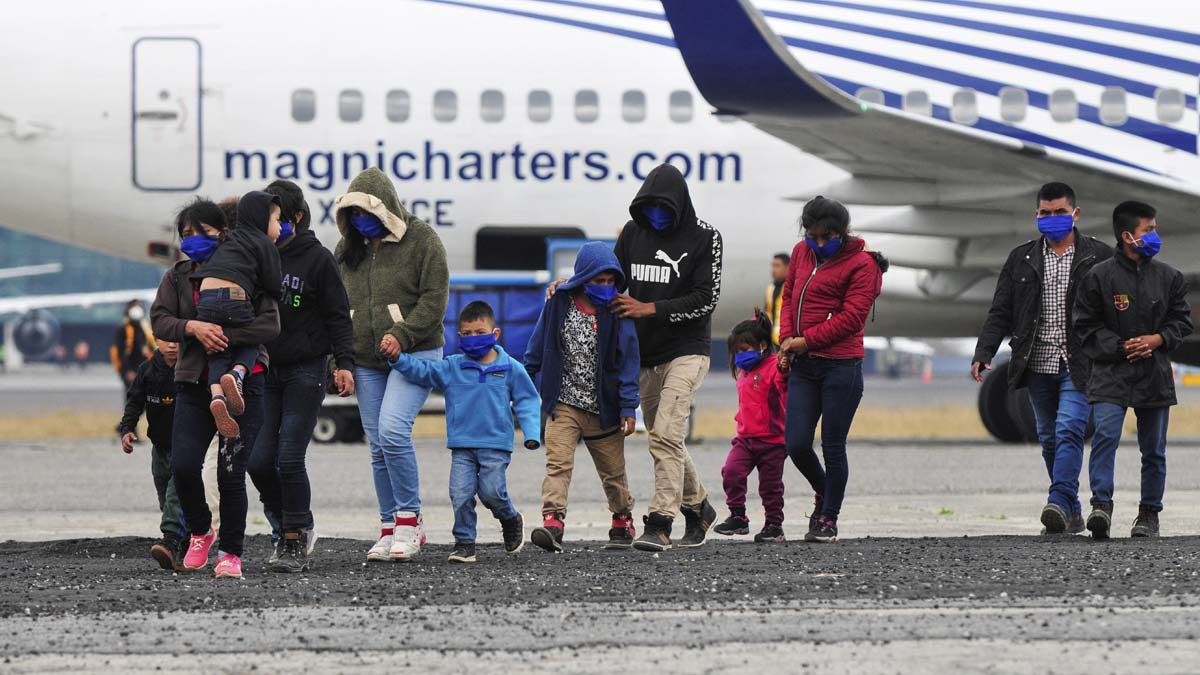
The Department of Homeland Security revealed that it sent over 200,000 migrants on a controversial parole program to 45 cities across the United States between January and August 2023.
The policy, which was enacted in October 2022, allowed migrants who had not entered the country illegally to fly directly into America.
Migrants were also required to have a sponsor in the US and pass various vetting tests.
It was initially announced for Venezuelans, before adding Haitians, Nicaraguans and Cubans amid one of the worst migrant crises in American history under President Joe Biden and Department of Homeland Security Secretary Alejandro Mayorkas.
Around 80 percent of the migrants were sent to four cities in the state of Florida: Miami – which got 91,821, more than any other city – Fort Lauderdale, Orlando and Tampa Bay were among the top 15 destinations, according to the DHS.
Under fire Secretary Mayorkas says the program led to a reduction in people from those nations illegally crossing the border.
‘It is a key element of our efforts to address the unprecedented level of migration throughout our hemisphere, and other countries around the world see it as a model to tackle the challenge of increased irregular migration that they too are experiencing,’ Mayorkas said.
New York City, Houston, Los Angeles and San Francisco were also in the top 10 of destinations.
Another 1.6million migrants are waiting to get into the country via this same program, DHS claims.
Multiple states, including Florida, have attempted to sue to stop the program but have thus far been unsuccessful.
‘Biden’s parole program is unlawful, and constitutes an abuse of constitutional authority. Florida is currently suing Biden to shut it down, and we believe that we will prevail,’ said Governor Ron DeSantis’ press secretary, Jeremy Redfern.
Since Biden took office, the U.S. has seen record-high numbers of illegal border crossings.
Customs and Border Protection has apprehended more than 7.6 million migrants illegally crossing the southern border – the majority of which are traveling from Central and South American countries in efforts to claim asylum in the U.S.
The crisis at the border has been a scandal for the Biden administration throughout his presidency, with former President and 2024 opponent Donald Trump promising to fix the problem.
Trump is ready to reshape American policy and detailed in interviews with TIME Magazine what some of these sweeping overhauls would include.
In a wide-ranging interview at Trump’s Mar-a-Lago resort in Palm Beach, Florida on April 12, the former president confirmed he would use detention camps to house illegal immigrants during deportation efforts.
He also didn’t rule out deploying the military to round up the millions of undocumented immigrants living in the country. As of January 2022, the illegal immigrant population in the U.S. was estimated to stand at 11.35 million.
Trump has repeatedly said he would take aggressive actions to address the border issue on Day One of a second term after President Joe Biden reversed almost all of his policies and plunged the country into an all-out illegal immigration crisis.
His proposals would include tapping local law enforcement, National Guard and, if necessary, members of the U.S. Military to round up illegal immigrants for deportation.
TIME National Politics Reporter Eric Cortellessa asked Trump if he would override the Posse Comitatus Act, which states the U.S. military cannot be deployed against civilians.
‘Well, these aren’t civilians,’ the former president replied. ‘These are people that aren’t legally in our country. This is an invasion of our country. An invasion like probably no country has ever seen before.’
‘They’re coming in by the millions. I believe we have 15 million now. And I think you’ll have 20 million by the time this ends,’ Trump predicted. ‘And that’s bigger than almost every state.’
He also said it isn’t likely he would have to house these immigrants in detention camps because he plans to deport them swiftly – but he didn’t rule out building more holding centers if needed during the operation.
‘No, I would not rule out anything,’ Trump said. ‘But there wouldn’t be that much of a need for them [detention camps], because of the fact that we’re going to be moving them out. We’re going to bring them back from where they came.’
Top 10 cities where migrants were flown via DHS program
News
Scientist Who Gave World the Covid Sequence Is Locked Out of His Lab by Chinese

The Chinese scientist who defied Beijing to publish the first coronavirus sequence has staged a sit-in-protest outside his laboratory after authorities suddenly evicted him.
Prof Zhang Yongzhen took to the steps outside the Shanghai Public Health Clinical Center on Sunday, in a rare sign of public dissent in China.
It is the latest of a series of setbacks, demotions and attempts to ostracise Prof Zhang, who experts say has been “treated cruelly for years” for releasing the Sars-Cov-2 sequence without government permission in January 2020.
The move allowed health officials worldwide to test for the virus and kick-started the race to develop vaccines and drugs within weeks.
But the Chinese government – which denies the pandemic’s origins, natural or otherwise, are within its borders – was furious and Prof Zhang has been under immense pressure and scrutiny ever since.
Last weekend, he was barred from entering his laboratory in Shanghai. Photos of him sleeping rough in the rain outside the front door as a protest while being overlooked by security guards have been shared widely on Chinese social media.
The Shanghai Public Health Clinical Center insisted that Prof Zhang’s lab had been closed for “safety reasons”, with alternative space provided while renovations were underway.
But according to an online statement from Prof Zhang, seen by the Associated Press but since deleted, the scientist was only offered another laboratory space after the eviction and it does not meet the safety standards required for his research.
“I won’t leave, I won’t quit, I am pursuing science and the truth!” he wrote in the now-deleted post on Weibo, a Chinese social media platform. “The Public Health Center are refusing to let me and my students go inside the laboratory office to take shelter.”
Prof Stuart Neil, a virologist at King’s College London involved in work tracing Covid’s origins, told The Telegraph that it was “depressing to see this continual harassment and punishment of Zhang Yongzhen”.
“He did a very brave thing by releasing the virus sequence despite the Chinese authorities wanting to control information about the initial outbreak. If he hadn’t forced [China’s] hand, how long would they have delayed releasing the sequence? Two to three weeks after the release of this sequence the first mRNA vaccine constructs were already in production for preclinical testing.
“I don’t think it’s exaggerating to say that without Zhang’s bravery there would have been a real delay in the roll-out of the first vaccine. And for it he has been treated cruelly for years, Prof Neil said.
Prof Peter Hotez, dean of the National School of Tropical Medicine, at the Baylor College of Medicine in Texas, added that Prof Zhang’s work during the pandemic had been “essential”, and stressed that “fighting pandemics relies heavily on open sharing of data”.
Chinese government ‘tightly controls narrative’
But Prof Zhang’s treatment reflects a broader crackdown on coronavirus research by the Chinese state.
Scientists working with collaborators in China, who asked not to be named amid concerns for their colleagues, told The Telegraph that international collaborations have become far more difficult since the pandemic.
Dr. Ingrid d’Hooghe, a senior Research Fellow at the Clingendael China Centre in the Netherlands, said the case is a reminder that it “remains impossible to do independent research into the origin of the virus” because of how tightly the Chinese government controls the narrative.
”[It] sends a signal to scientists in China that they will be punished if they do something without having received permission by the authorities… [and] signals that international collaboration will remain under tight control of the government and carries risks for Chinese scientists,” she told the Telegraph. “[It] reflects the overall further deterioration of academic freedom in China in recent years.”
Prof David Robertson of the University of Glasgow’s Centre for Virus Research, added: “Making that first SARS-CoV-2 genome available was really really important, and Zhang Yongzhen should be celebrated for this, not forced out of his scientific role.”
News
Trump Held in Contempt, Fined for Violating Gag Order in Hush Money Trial

New York County Judge Juan Merchan has ruled that former President Donald Trump violated a gag order during his trial, holding him in criminal contempt and threatening him with jail time for any further infractions.
Merchan also ordered Trump to remove the “seven offending posts” from Truth Social.
“Defendant is hereby warned that the Court will not tolerate continued willful violations of its lawful orders and that if necessary and appropriate under the circumstances, it will impose an incarceratory punishment,” the judge wrote in the order:
ORDERED, that Defendant pay a $1,000 fine for each of the nine violations of this Court’s lawful order by the close of business on Friday, May 3, 2024; and it is further ORDERED that Defendant remove the seven offending posts from Defendant’s Truth Social account and the two offending posts from his campaign website by 2:15pm Tuesday, April 30, 2024.
Merchan had the authority to send Trump to jail for up to 30 days for allegedly violating his gag order. Democrat Manhattan District Attorney Alvin Bragg backed down from asking the judge to jail Trump for allegedly violating the order, according to court reporters.
Trump appeared to call Bragg’s bluff. Trump said in April that it would be a “GREAT HONOR” to become a “modern-day Nelson Mandela” in the “clink” for speaking the truth about Merchan.
The gag order prevents Trump from making public comments about witnesses participating in the trial, counsel other than Bragg, “members of the court’s staff and the District Attorney’s staff, or … the family members of any counsel or staff member, if those statements are made with the intent to materially interfere with … counsel’s or staff’s work” on the case. It also encompasses prospective jurors.
“The gag order has to come off,” Trump previously told reporters outside the Manhattan courthouse. “People are allowed to speak about me, and I have a gag order, just to show you how much more unfair it is.”
“They can say anything they want,” Trump said about his political foes. “They can continue to make up lies and everything else. They lie. They’re real scum. But you know what, I’m not allowed to speak.”
“So why am I gagged about telling the truth?” Trump questioned. “I’m only telling the truth. They’re not telling the truth.”
Bragg charged Trump with 34 felonies in the criminal case concerning alleged election interference and a legal retainer paid to Michael Cohen. The trial is the first-ever criminal trial of a president of the United States. Trump could face jail time if convicted.
A majority of Americans doubt Trump’s criminal trial will conclude with a fair outcome, a CNN poll on Friday found. Increasing numbers of Americans see the criminal trial of Trump as irrelevant to his fitness for reelection, the CNN poll further found, while only 13 percent believe Trump is being treated the same as other “criminal defendants.”
Only about one-third of American adults believe Trump did anything illegal regarding the case, an AP-NORC Center for Public Affairs Research poll found Tuesday.
The case is New York v. Trump, No. 71543-23, in the New York Supreme Court for New York County.
News
Protesters Occupying Hamilton Hall Will Be Immediately Expelled from Columbia
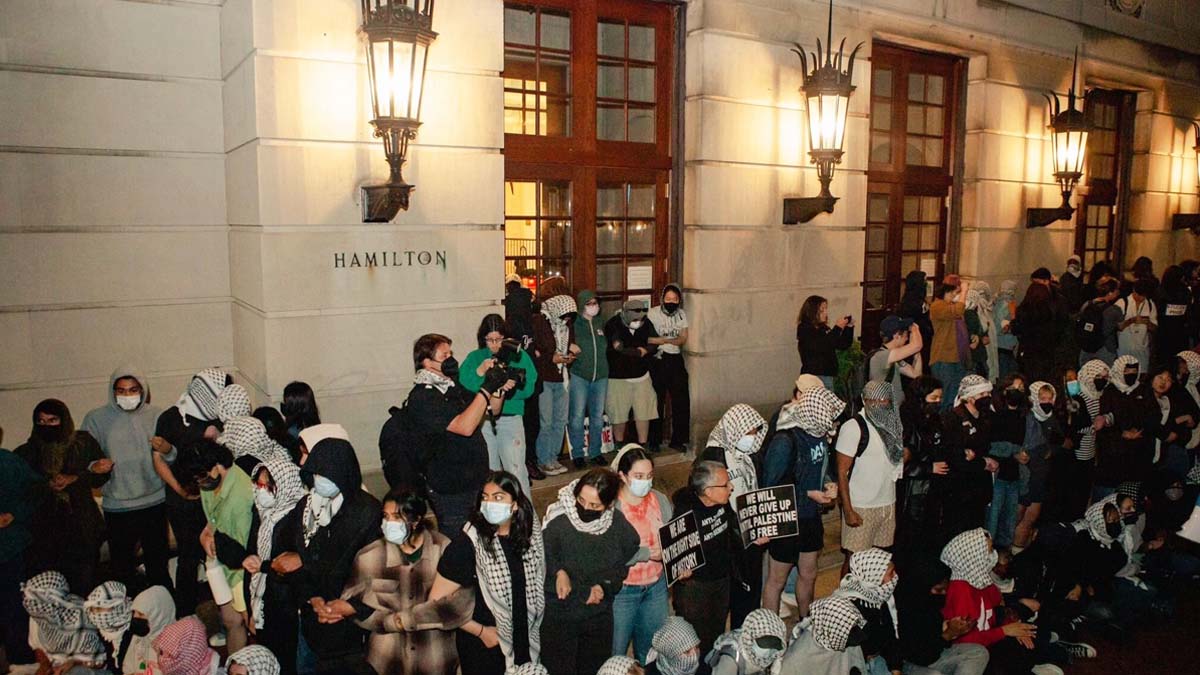
Student protesters occupying Hamilton Hall will face expulsion, University spokesperson Ben Chang wrote in a Tuesday press release.
“Protesters have chosen to escalate to an untenable situation – vandalizing property, breaking doors and windows, and blockading entrances – and we are following through with the consequences we outlined yesterday,” Chang wrote.
Dozens of protesters have occupied Hamilton Hall—which they renamed “Hind’s Hall,” in honor of Hind Rajab, a six-year-old Palestinian child killed by the Israeli military—since 12:30 a.m. on Tuesday. Upon entry, protesters sealed the building within five minutes, barricading entrances with wooden tables, chairs, and zip ties.
“We regret that protesters have chosen to escalate the situation through their actions,” Chang wrote. “Our top priority is restoring safety and order on our campus.”
Chang also stated that students who remain in the “Gaza Solidarity Encampment” will face interim suspensions. Columbia began suspending students involved in the encampment on Monday, according to a University spokesperson.
Suspended students do not have access to any University properties, including academic buildings and residence halls, and may not complete the semester nor graduate.
“As we said yesterday, disruptions on campus have created a threatening environment for many of our Jewish students and faculty and a noisy distraction that interferes with teaching, learning, and preparing for final exams, and contributes to a hostile environment in violation of Title VI,” Chang wrote.
The disciplinary action comes against the backdrop of the University’s ongoing Commencement preparations, as staff continues to set up bleachers on Low Plaza and tents on the lawns across south campus.
Columbia University Apartheid Divest identified the protesters occupying Hamilton Hall as an “autonomous group” in a Tuesday 2:07 a.m. press release posted on X.
In a Monday substack post, CUAD reaffirmed their demands for Columbia: divestment from companies with ties to Israel, financial transparency on direct and indirect holdings, and amnesty for all disciplined pro-Palestinian students.
“Admitted students day is over—commencement is on its way,” CUAD wrote in the post. “Let’s see how much of this campus we can reclaim by then!”
News
House Republicans Launch Investigation Into Federal Funding for Universities Amid Campus Protests

House Republicans on Tuesday announced an investigation into the federal funding for universities where students have protested the Israel-Hamas war, broadening a campaign that has placed heavy scrutiny on how presidents at the nation’s most prestigious colleges have dealt with reports of antisemitism on campus.
Several House committees will be tasked with a wide probe that ultimately threatens to withhold federal research grants and other government support to the universities, placing another pressure point on campus administrators who are struggling to manage pro-Palestinian encampments, allegations of discrimination against Jewish students and questions of how they are integrating free speech and campus safety.
The House investigation follows several recent high-profile hearings that precipitated the resignations of presidents at Harvard and the University of Pennsylvania. And House Republicans promised more scrutiny, saying they were calling on the administrators of Yale, UCLA and the University of Michigan to testify next month.
“We will not allow antisemitism to thrive on campus, and we will hold these universities accountable for their failure to protect Jewish students on campus,” said House Speaker Mike Johnson at a news conference.
Nationwide, campus protesters have called for their institutions to cut financial ties to Israel and decried how thousands of civilians in Gaza have been killed by Israel following the deadly attack by Hamas on Oct. 7.
Some organizers have called for Hamas to violently seize Israeli territory and derided Zionism. Jewish students, meanwhile, have reported being targeted and say campus administrators have not done enough to protect them.
After Johnson visited Columbia last week with several other top House Republicans, he said “the anti-Jewish hatred was appalling.”
Republicans are also turning to the issue at a time when election season is fully underway and leadership needs a cause that unites them and divides Democrats. The House GOP’s impeachment inquiry into President Joe Biden has fallen flat and the Republican conference is smarting after a series of important bills left GOP lawmakers deeply divided. Democrats have feuded internally at times over the Israel-Hamas war and how campus administrators have handled the protests.
Senate Majority Leader Chuck Schumer, a New York Democrat, said in a floor speech Tuesday that it was “unacceptable when Jewish students are targeted for being Jewish, when protests exhibit verbal abuse, systemic intimidation, or glorification of the murderous and hateful Hamas or the violence of October 7th.”
Rep. Pete Aguilar, the No. 3 House Democrat, at a news conference Tuesday said that it was important for colleges “to ensure that everybody has an ability to protest and to make their voice heard but they have a responsibility to honor the safety of individuals.”
“For many of Jewish descent, they do not feel safe, and that is a real issue,” he said, but added that he wanted to allow university administrators to act before Congress stepped in.
But the Republican speaker promised to use “all the tools available” to push the universities. Johnson was joined by chairs for six committees with jurisdiction over a wide range of government programs, including National Science Foundation grants, health research grants, visas for international students and the tax code for nonprofit universities.
Without Democratic support in the divided Congress, it is not clear what legislative punishments House Republicans could actually implement. Any bills from the House would be unlikely to advance in the Democratic-controlled Senate.
But so far, the House hearings with university presidents have produced viral moments and given Republicans high-profile opportunities to denounce campuses as hotbeds of antisemitism. In December, the presidents of Ivy League universities struggled to answer pointed questions about whether “calling for the genocide of Jews” would violate each university’s code of conduct.
Rep. Elise Stefanik, the New York Republican who posed the question in the December hearing, said it became the highest-viewed congressional hearing in history. She also cast the campaign against antisemitism as part of a broader conservative push against what they say is overt liberal bias at elite American universities.
“Enough is enough,” she said. “It is time to restore law and order, academic integrity and moral decency to America’s higher education institutions.”
The House Committee on Education and the Workforce is also requesting that the administrators of Yale, UCLA and the University of Michigan appear at a hearing on May 23 that focuses on how they handled the recent protests.
“As Republican leaders, we have a clear message for mealy-mouthed, spineless leaders: Congress will not tolerate your dereliction of duty to your Jewish students,” said the committee chair, North Carolina Rep. Virginia Foxx.
At a hearing of the committee earlier this month, Columbia University’s president took a firm stance against antisemitism. But at the same time, a protest was underway on Columbia’s campus that would soon set off others like it nationwide. The university began suspending students this week in an attempt to clear the protest encampment on campus.
The university is also facing federal legal complaints. A class-action lawsuit on behalf of Jewish students alleges Columbia breached its contract by failing to maintain a safe learning environment.
Meanwhile, a legal group representing pro-Palestinian students is urging the U.S. Department of Education’s civil rights office to investigate whether Columbia’s treatment of the protesting students violated the Civil Rights Act of 1964.
Senate Republican Leader Mitch McConnell called on university administrators to “take charge.”
“On campus, protect Jewish community members. Clear the encampments. Let students go to class and take their exams. And allow graduations to proceed,” he said.
News
Biden Admin Takes Step to Make Marijuana Use Less Serious Crime

The U.S. Drug Enforcement Administration will move to reclassify marijuana as a less dangerous drug, The Associated Press has learned, a historic shift to generations of American drug policy that could have wide ripple-effects across the country.
The DEA’s proposal, which still must be reviewed by the White House Office of Management and Budget, would recognize the medical uses of cannabis and acknowledge it has less potential for abuse than some of the nation’s most dangerous drugs. However, it would not legalize marijuana outright for recreational use.
The agency’s move, confirmed to the AP on Tuesday by five people familiar with the matter who spoke on the condition of anonymity to discuss the sensitive regulatory review, clears the last significant regulatory hurdle before the agency’s biggest policy change in over 50 years can take effect.
Once OMB signs off, the DEA will take public comment on the plan to move marijuana from its current classification as a Schedule I drug, alongside heroin and LSD. It moves pot to Schedule III, alongside ketamine and some anabolic steroids, following a recommendation from the federal Health and Human Services Department. After the public-comment period the agency would publish the final rule.
It comes after President Joe Biden called for a review of federal marijuana law in October 2022, and has moved to pardon thousands of Americans convicted federally of simple possession of the drug. He has also called on governors and local leaders to take similar steps to erase marijuana convictions.
“Criminal records for marijuana use and possession have imposed needless barriers to employment, housing, and educational opportunities,” Biden said in December. “Too many lives have been upended because of our failed approach to marijuana. It’s time that we right these wrongs.”
The election year announcement could help Biden, a Democrat, boost flagging support, particularly among younger voters.
Schedule III drugs are still controlled substances and subject to rules and regulations, and people who traffic in them without permission could still face federal criminal prosecution.
Some critics argue the DEA shouldn’t change course on marijuana, saying rescheduling isn’t necessary and could lead to harmful side effects.
On the other end of the spectrum, others argue say marijuana should be dropped from the controlled-substances list completely and instead regulated like alcohol.
Federal drug policy has lagged behind many states in recent years, with 38 having already legalized medical marijuana and 24 legalizing its recreational use.
That’s helped fuel fast growth in the marijuana industry, with an estimated worth of nearly $30 billion. Easing federal regulations could reduce the tax burden that can be 70% or more for businesses, according to industry groups. It could also make it easier to research marijuana, since it’s very difficult to conduct authorized clinical studies on Schedule I substances.
The immediate effect of rescheduling on the nation’s criminal justice system would likely be more muted, since federal prosecutions for simple possession have been fairly rare in recent years. Biden has already pardoned thousands of Americans convicted of possessing marijuana under federal law.
-


Lindsey Graham Phone Hacked: Report
11 hours ago • < 1 min read • 13 Comments -


CIA Contractor Claims Mike Pompeo, Staff Withheld Information from Trump
11 hours ago • 2 min read • 14 Comments -
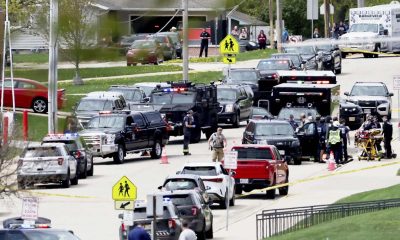

14-Year-Old Active Shooter Shot and Killed by Police Before He Could Enter Wisconsin Middle School
11 hours ago • 2 min read • 4 Comments -


More Than $300K Raised for UNC Frat Brothers Who Protected American Flag from Pro-Palestine Mob
12 hours ago • 2 min read • 10 Comments


KILL ALL OF THEM MR. NETHANYAHU!!!! DON`T STOP UNTIL THEY ALL ARE INSTINCT!! REMOVE THEM FROM THIS WORLD! WE WILL ALL BE BETTER OFF!!!!!
start supplying them chemical weapons and have the idiots eliminate themselves from the face of the earth already. there is nothing useful to human life that comes out of the region
I saw a poll today, that 49% of young voters justify the murders of Israelites. To you young voters. If you can justify a child’s parents being butchered publicly in that child’s Eyes
You are not human. And to see its tiny friend’s beheaded in front of them you are not human. I was afforded the vision through Angel’s Eyes. So I’m gona send you this vision through courtesy of your dreams.A nightmare you will never forget. It is time to cease fire. And it is time for Hamas, and Hezbollah, to know The Elites who, have deceived them.For if not, A mighty Soul will bring his wrath upon us all. Are you ready for The Great fallen Angel to claim his bounty? He will take you to his oblivion for Eternity. Only God all mighty I Am, that I Am, Can save you now.You young voters who turn your eyes away from Atrocity, will Perish. I beg in Gods Name, you don’t have to witness these Atrocities. No matter Your Race, or where you dwell, you will not escape this. Dream this nightmare, bestowed upon you. FOR IT is Holy and the spirit condemns it.
3rd World Terrorist Mentality, Demonic led mindless reprobates.
ROMANS 13:4-7 “But if thou do that which is evil, be afraid; for he beareth not the sword in vain: for he is the minister of God, a revenger to execute wrath upon him that doeth evil.”